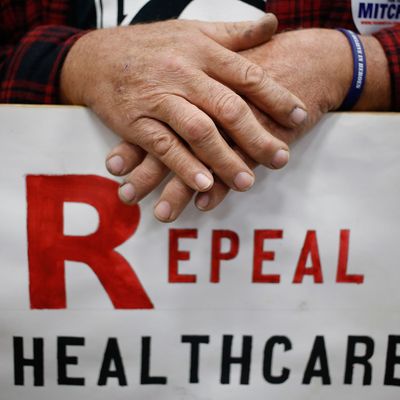
“Many Republicans assume” that a positive election result for their party will inspire it to attempt another repeal of Obamacare next year, reports Caitlin Owens. It may be difficult to believe that, after a devastating failure that registered historically ruinous approval in public opinion surveys, Republicans would try the same thing again with a presumably narrower House majority. But such an outcome may be more plausible than you might think.
If Republicans keep their House majority, albeit a smaller one, the psychological aftershocks would be almost incalculable. Both parties have priced in the near certainty that Democrats will take the House. That expectation is one reason the Republicans have all but given up on legislating after dragging their tax cut past the finish line. The Republicans who survived the anticipated wipeout of the midterm elections to reconstitute a majority caucus would emerge blinking into the sunlight of a transformed landscape. The price of Obamacare repeal would have been paid by the Republican House members who lost. Those who returned to Washington would feel no such constraint.
In the Senate, a bill to keep repeal alive failed by just one vote. The surprise margin was supplied by John McCain, who is dying of cancer, and is going to be replaced by a Republican whose loyalty to the party agenda could presumably be ascertained in advance. If Republicans can add a couple more seats, they could give themselves enough margin to overcome the squishy reservations of Susan Collins and Lisa Murkowski. If they merely hold their narrow majority, they might simply prevail on the two senators to submit. (Murkowski appeared to have been bought off by a special deal for her state last year.)
Trump has never stopped talking about the failed repeal vote nor reliving his anger with McCain. It is hard to think of a legislative priority that would rank higher in his mind. A congressional party shorn of its most prominent Trump skeptics, many of whom are retiring, would behave even more submissively toward its leader.
The Trump era has been a tug of war between the Republican Party’s ingrained advantages — the immovable loyalty of the party base in combination with House and Senate maps that give Republicans disproportionate voting power — and the year-and-a-half-long flaming dirigible crash that is the Trump presidency. Events that would destroy a normal presidency seem to have little impact on this one.
A Politico retrospective on the Charlottesville imbroglio from last year, after which Trump’s approval ratings have mainly held steady, quotes a former White House official observing, “The lesson of the Trump presidency is that no short-term crisis matters long term.” If Republicans can withstand the president calling Nazis “good people,” why not take another crack at health care?
“Repeal is like fight club,” one GOP operative told Owens. “First rule is not to talk about it.” It would be disorienting to the public for Republicans to turn around and implement a wildly unpopular scheme to throw Americans off their insurance after spending a year refusing to bring up the topic in public. But a Republican Congress given a new lease on life by the midterms would conclude that public opinion no longer posed any threat.






























